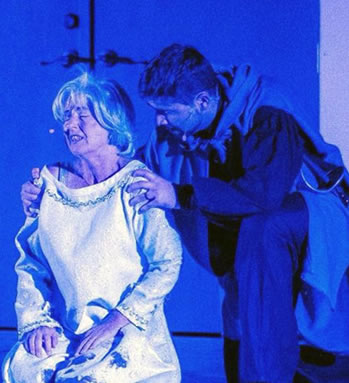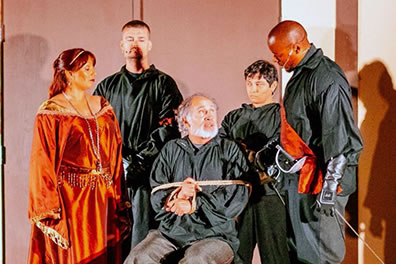King Lear
The Way It Begins Promises the End
Shakespeare in the Vines, Baily Vineyard & Winery, Temecula, California
Friday, June 22, 2018, center of first row on the second plateau of the amphitheater-like hill.
Directed by Zackary Bonin
 Kent (Nick McAfee, right) tries to comfort his mentally declining queen (Bobbie Helland), in the Shakespeare in the Vines production of William Shakespeare's Lear. Photo courtesy of Shakespeare in the Vines.
Kent (Nick McAfee, right) tries to comfort his mentally declining queen (Bobbie Helland), in the Shakespeare in the Vines production of William Shakespeare's Lear. Photo courtesy of Shakespeare in the Vines. Recently, I stumbled upon a video on the Web showing cars waiting at a railroad crossing. The gates are lowered, the warning lights are flashing. A single automobile passes the waiting cars, goes around the lowered gates, and is evaporated by the onrushing train. Suicidal intentions aside, why would anybody do that? Yet, people do such stupid things all the time. They confidently try beating the train. They blithely dive into water before checking its depth. They impatiently pass a stopped school bus with its lights flashing. They impetuously use their cigarette lighter to find a gas leak. We watch the stupidity unfold—strange how it seems to do so in slow motion—helpless to intervene. If we do, what fate befalls us trying to stop the onrushing car or grab the lighter.
That is the opening scene of William Shakespeare's King Lear, a train wreck unfolding before our eyes caused by stupid, impetuous behavior. The 80-year-old British monarch, desiring retirement, plans to divide his kingdom among his three daughters (the map already is drawn) but suddenly wants to know which daughter loves him most. This seemingly innocent but ego-driven game goes terribly wrong for the king, his favored princess, and his chief advisor. I've read and heard and seen critics who complain that the play founders on such a silly pretext. Even Cordelia's asides don't justify why she simply can't tell her father, "I love you more than you can e'er conceive" (opaque yet true). Voilà! No tragedy! (No play, either). Critics and directors try to solve Shakespeare's shortcomings by encasing the first act in their own conceptual context that sometimes devours the rest of the play. If only Shakespeare had been more specific in that first scene, King Lear would be a perfect play.
Well, Shakespeare was specific, and the play is as perfect as a play gets. The keys to a kingdom's disintegration are in the details, as Zackary Bonin demonstrates staging that opening scene in his directorial debut, Shakespeare in the Vines' production of Lear—just Lear with the title role regendered. Bonin finds most of his details and key clues in the text, and he cast Bobbie Helland, playing Lear for the second time in her career and armed with the experience of the part's myriad dimensions. The rest of the production doesn't quite maintain the promise of the first scene, hitting some technical bumps and superfluous potholes along its journey, but Bonin and Helland achieve what any King Lear must achieve to be considered a success, arriving at a climax that tugs at our tear ducts while bringing home the play's 2018 relevancy.
The play itself is only half of the of the evening's fare; after all, the playwright makes up only half of the company's name, Shakespeare in the Vines. These particular vines—Riesling, Sauvignon Blanc, Merlot, Malbec, Sangiovese, and Cabernets Sauvignon and Franc—belong to Baily Vineyard and Winery on an undulating landscape west of Temecula, California. Artistic Director Sheila Havens Ryle founded Shakespeare in the Vines in 2005 after moving here from San Pedro in Los Angeles County where she was a high school theater and music teacher. She thought the dramatic landscape a perfect place for an outdoor Shakespeare theater, and her company took up residencies at different wineries for the first nine years. Then, Phil and Carol Baily made Ryle an offer: If you come, we will build a theater.
Sitting to the side of the winery's parking lot, the outdoor stage spreads out from a half-timbered backdrop with three doors, a center balcony, and panels angling forward on the sides framing the stage (decorated with coats of arms for this production). Tables for prime seating fill in the ground between the stage and three terraces of seats with views of palm trees, distant mountains, and vineyards rising to Mediterranean-style homes and chateaus, plus the constellations in the heavens after nightfall. Families and groups of patrons bring dinners to eat as they socialize at the tables before the shows over bottles of Baily's various varietals and blends. This particular outdoor location has few issues with ambient aural intrusions other than those the production itself cause. The actors wear microphones, but in a play with much mischief, anger, and violence, raised voices distort the dialogue, and screams make us cringe as much as seeing eyes gouged out.
Bonin played Edmund to Helland's previous Lear, and based on that experience he concluded that senility wasn't necessarily the impairment dictating Lear's behavior. Rather, his pathologically quick-tempered, egomaniacal personality hampered his judgement, especially at an epochal moment of his life (and, by extension, of his kingdom). "Zack said I needed to be really careful to hear [the other characters] as very reasonable," Helland told me in an interview. "I've got to hear them, acknowledge that they're right and reasonable, and then say, 'I'm the queen.' That turning off what's reasonable to insist on my way—and, of course, they screw me over—leads to shame because I'm wrong, and I can't acknowledge that I'm wrong. It's the beginning of this powerlessness and rage that I'm afraid is going to turn into madness and even more rash decisions. That's the journey Zack took me on for this version of it, and I feel like it works better than starting off crazy."
Some of Bonin's choices in the opening scene may not be vital but are nevertheless interesting. Gloucester's bastard son, Edmund (Preston Helms), scampers off the stage at his father's imploring as the royal party enters but stops at the door to eavesdrop. Before he leaves, Lear's second daughter, Regan (Monica Reichl), sees him, and her expression notes that this newcomer to the court is a pleasing specimen indeed. Costuming by Wendy Akerley-McKee is generically distant-time-and-place, but the colors obviously matter: Eldest daughter Goneril (Rebecca Reber) and her husband, the Duke of Albany (Billy Clebeck), are wearing green; Regan and her Duke of Cornwall (J. Kay Weldon) are in red; youngest daughter Cordelia (Hannah Dorss) is wearing white with gold trim, just like her mother.
Helland's Lear has an obvious sense of command delivering the first half of her first speech, laying out the purpose of her dividing the kingdom as she plans her retirement. Then she says, "Tell me, my daughters—since now we will divest us both of rule, interest of territory, cares of state—which of you shall we say doth love us most." Helland plays the dashes as if Lear just now thought up this love contest. The court certainly reacts with surprise. Goneril and Regan try to get their game plan together while shooting wary glances at each other. Dorss's Cordela, responds with a "this is stupid" attitude, mom being mom, and this shades her asides; it's not a game she needs to play. Indeed, when she does engage with her mother in answering, "I cannot heave my heart into my mouth," the two seem to be conversing in easy terms. Lear's "Nothing will come of nothing, speak again," Helland frames as a gentle prod, and even "So young and so untender?" seems to be casual chiding, to which Cordelia confidently answers, "So young, my lady, and true."
"Let it be so," Lear replies leading into Helland unleashing unholy hell with: "Thy truth then be thy dower." The shock of the outburst has rippling effects across the stage. Cordelia is dumbfounded; she thought it was safe to cross the street with the school bus lights flashing red. Her sisters slip from stunned to satisfied: at last, it's happening to Cordy! Previously standing by with somber confidence, Kent (Nick McAfee) now eyes the queen with growing alarm. "Good my liege," he interjects with forced calm. Lear cuts him off and continues raging. "Royal Lear," Kent tries again more forcefully but, notably, resorts to excessive flattery: "Whom I have ever honored as my queen, loved as my mother, as my master followed, as my great patron thought on my prayers—" But Lear cuts him off with a threat of execution. This leads Kent to burst in exasperation—one wonders how long it's been building. "Be Kent unmannerly when Lear is mad? What wouldst thou do, old woman?" Turning the title character into a queen creates opportunities to explore cultural gender issues, such as mother/daughter relationships (a mother wishing for her daughter to be barren). Thus does this single expression, "old woman" vice "old man," jar with cultural significance, playing on our preconditioned notions of gender, aging, and women in power (e.g., the veiled insults aimed at 78-year-old U.S. House Speaker Nancy Pelosi, even from her own party). In the wider context of this scene, Kent knows his queen to be impetuous, but her current behavior is extreme, and he sees the train coming. He chooses to jump in front of her, and she banishes him, her most loyal cabinet member, on the spot.
In all the times I've seen this play, something has never occurred to me until this night: who is not on the stage. Gloucester (Richard Rivera), who Lear had sent off to fetch the French king and Duke of Burgundy, now reappears, laughing with the two men. Gloucester has to make way for Kent's hurried exit, to which Rivera responds with surprised annoyance, but quickly resumes his sense of high humor in the presence of the Queen. "Right noble Burgundy," she says, "When [Cordelia] was dear to us, we did hold her so, but now her price is fallen." Imagine being absent five minutes and upon your return seeing the queen tendering hate toward her favorite daughter: Rivera plays that dumbfounded state, his cluelessness our clue that what we're seeing is beyond Lear's typical tyranny (everybody must bow whenever she gets up, sits down, or passes by, and now in her agitation, the bowing is near constant stage business). Goneril and Regan testify to that in their conversation at scene's end. "He always loved our sister most, and with what poor judgement he hath now cast her off appears too grossly," Goneril says. "Such unconstant starts are we like to have from him as this of Kent's banishment," Regan says five lines later. If mom so impetuously dispensed with Cordelia and Kent, no one is safe.
You can argue these readings and wonder how much they might be informed by current events (based on my interviews with the cast and director, they are). In my Shakespeareances.com commentary on this play ("The Oldest Have Borne Most: King Lear and the Nihilism of Being Old"), I link Lear's parenthetical aside before suggesting the love contest to elderly parents needing reassurance they will be cared for. Even so, I've never seen a first scene of King Lear so clearly careening into the ensuing chaos and directly into the subplot, too. Any servant could have fetched France and Burgundy, but Shakespeare chose Gloucester, who is still dumbfouned upon entering in the next scene saying, "Kent banish'd thus! and France in choler parted! And the king gone to-night! Subscribed his power! Confined to exhibition! All this done Upon the gad!" In this perplexed state he is particularly gullible to Edmund's scam against Gloucester's legitimate, older offspring, Edgar.
Edgar is regendered, as well, though Sam Maybrier keeps the name, Edgar. This choice is a bit confusing, and Maybrier's Edgar seems too savvy to fall for Edmund's ploy. In the hovel scene, Maybrier's Edgar disguised as Poor Tom speaks her gibberish to herself under the other characters' conversations instead of engaging with them, an odd choice both textually and in stage practice. By one measure, Edgar is the production's most lethal person, killing three people in her way. Extratextually she stabs one of the officers seeking her before she dons the Poor Tom disguise, and then in combat she kills Oswald (Johnny Thunder playing Goneril's servant as a clown) and Edmund, the latter in quite the battle royale. The dagger she uses has its own arc. Back in Act I, Scene 2, the enraged Gloucester uses his dagger to stab Edmund's fraudulent letter, supposedly written by Edgar, into the wall. When Edmund later tells Edgar to avoid his father's wrath and go armed, he pulls the dagger out from the wall and gives it to Edgar. This, Gloucester's dagger, Edgar uses to kill Edmund. Maybrier's Edgar also has a nice moment when she leads her father to what she tells him is the edge of the Dover Cliffs. Gloucester drops his staff for assurance, and Maybrier catches it, pauses, then lets it fall to the stage. Gloucester is satisfied.
The Fool (Wendi Johnson) also is regendered, which matters less than how she's interpreted. She seems to recognize Kent from the start, and she has an obvious history with Goneril that apparently includes beatings. The real shocker, though, comes in the hovel during Lear's faux trial of her daughters. The Fool begins imitating Goneril, and Lear in another rage stabs the Fool thinking she really is her daughter. That's one way to account for the Fool's disappearance from the play after this scene.
The production is at its best when Bonin digs into the text. The scene of Kent accosting Oswald and ending up in the stocks is grandly comic with pinpoint timing in the lines and fully realized characterizations by all parties involved, not just McAfee's Kent and Thunder's Oswald but also Weldon's Cornwall, Reichl's Regan, and Rivera's Gloucester displaying pinpoint ensemble work. When Bonin mines further afield from the text, some of the action becomes superfluous, such as having Albany accompany Goneril to Gloucester's place. We hear him leave when Gloucester tells Edmund of the division between the two dukes. I grant that having Edmund return to the stage after the Cornwalls' attack on Gloucester is a meaningful interpolation. Edmund sees his father's eyes on the floor, pauses, then puts on the Earl of Gloucester's sash and departs.

Gloucester (Richard Rivera, center) faces the wrath of Regan (Monica Reichl, left) and the Duke of Cornwall (J. Kay Weldon) right before the two gouge out Gloucester's eyes in the Shakespeare in the VInes production of William Shakespeare's Lear at Baily Vineyard and Winery in Temecula, California. Photo courtesy of Shakespeare in the Vines.
Helms is a highlight of this production, exploring his lines for every hint that could add dimensions to Edmund's personality. In his opening speech on bastardy, he chews on the word base like a piece of overcooked liver. For the speech's last line, "Now, gods, stand up for bastards!" Helms uses the commas as a cue to sneer at the very notion that there are such things as gods. After Edmund sends Edgar packing and wounds himself to appear as if his brother had attacked him, Helms wastes no time slicing his arm and cries for help. When no one appears immediately, he says incredulously, "What, no help?" This Edmund feels slighted at every turn.
A key moment in Helland's arc for Lear also is extratextual when she recognizes the disguised Kent in the hovel and he quickly turns away. This is her Lear's breaking point: the queen who's always in command knows it can't be Kent because she banished him, and now she speaks her crux line, "My wits begin to turn." Note that this moment comes after Lear has been railing at the storm, which suggests that she was simply Lear being Lear on the heath.
Though her journey into and through madness is hard to track, Helland grounds the play's final scene in gut-wrenching emotion. She enters from behind the audience, following Kent carrying the lifeless Cordelia, and she escalates the text's three howls from a mournful cry to a scream of agony reaching Orion above us. Kent lays the body on the front of the stage. "Is this the promised end?" he says as Lear cradles Cordelia's head in her lap. The mother is there after all, and maybe has been all along. "Cordelia, Cordelia!" she says pleadingly. "Stay a little."
This is the production's tear-tapping moment. It comes late, well after the mad Lear meets the blind Gloucester, after Lear's "no cause, no cause" reunion with a forgiving Cordelia, after their imprisonment where "We two alone will sing like birds i' the cage," even after Lear's howling entrance with the murdered Cordelia. "Cordelia, Cordelia! Stay a little" resonates because Helland's Lear is so genuinely woeful at this moment even as the moment hammers home a tragic truth: It is the lot of the impetuous that they can never fully fathom the promised end.
Eric Minton
February 5, 2019
Comment: e-mail editorial@shakespeareances.com
Start a discussion in the Bardroom




 Find additional Shakespeareances
Find additional Shakespeareances